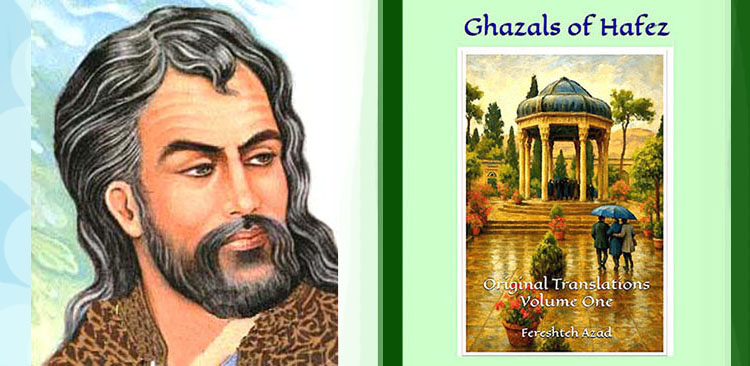
Hafez (c. 1315–1390), the beloved Persian poet from Shiraz, is celebrated for verses that blend lyrical beauty with spiritual depth. Steeped in Sufi mysticism, his poetry often weaves the language of love, wine, and the tavern into metaphors for divine union, expressing both the ache of longing and the ecstasy of closeness to God. His Divan has inspired readers for centuries, serving as a source of joy, and in Persian culture, his works are still opened at random—fal-e Hafez—for insight and inspiration.----------------------------------------
Khajeh Mohammad was a Persian lyric poet whose collected works are regarded by many as one of the highest achievements in Persian literature. His works are often found in the homes of Persian speakers, who learn his poems by heart and use them as everyday proverbs and sayings. Hafez is best known for his Divan, a collection of his surviving poems probably compiled after his death. Hafez primarily wrote in the literary genre of lyric poetry or ghazals, which is the ideal style for expressing the ecstasy of divine inspiration in the mystical form of love poems.
Themes of his ghazals include the laments of the lover to the Beloved, many profound spiritual nuggets of Truth and poetic depiction of the stages of inner attainment, as well as an unabashed criticism of hypocrisy. In his ghazals, Hafez deals with subjects like wine (metaphor for divine love), taverns (places of gathering for aspirants), Saqi (wine-bearer, Master), shedding tears of blood (intense longing for the Beloved), and so much more, all representing aspects of the human journey, whether interpreted in the worldly sense or in the voice of the lover of God who has renounced the attractions of the world in exchange for spiritual ecstasy, freedom from orthodoxy, and ultimate union with the real Self (God), which is the destiny of all beings, and the true purpose of life. "Ghazals of Hafez, Original Translations, Volume One" June 2025, by Fereshteh Azad).

A highly acclaimed book translated into English has recently been published by Fereshteh Azad. She was born and raised in Tabriz, Iran. She attended a private French Catholic school, where they had the regular Persian curriculum in the mornings and a French curriculum in the afternoons. Her native home language was Azari Turkish, a dialect spoken in northern Iran. She started learning English in high school. Her last two summers of high school, were in England to improve her English. She then attended University in the US and has lived in the US since then.
Ghazal 169
Did you see O heart, what the pain of longing for the Beloved did again?
When He left, what He did with His devoted lover?
Oh, what game He started with those enchanting eyes.
Oh, that blissful One, what He did with the sober people!
My tears turned crimson like the sunset from my Beloved’s lack of kindness,
See what my ruthless luck did in this affair!
O Saqi, give me the jug of wine, for it is unknown,
What the unseen Script Writer is doing behind the secret veil.
The One who painted this azure circle,
No one knows what purpose He had in the turning of the compass.
An electric spark flew forth from the house of Layli this morning,
Oh, what it must have done with the haystack of Majnoon’s heart!
The spark of Love ignited the fire of longing in Hafez’s heart and burned it,
See how the Ancient Beloved treated His lover?
Ghazal 211
A star twinkled and became the Moon of the gathering,
Became the companion and friend of our bolting heart.
My sweetheart who never went to school or learned to write,
In coquettishness, became the Master teacher of a hundred teachers.
The tavern of Love flourishes,
When the arch of my Beloved’s brow becomes its engineer.
Like the breeze intoxicated by the fragrance of His Presence, the ailing hearts of lovers
sacrifice themselves to the face of the amaryllis and the eyes of the narcissus.
The Friend has placed me on a high pedestal
Look and see how the city Fakir became the king of the gathering.
For God’s sake, wipe the secretions of wine from Your lips,
For my mind is tempted by thousands of sins.
Your enticing mannerism created such love in Your lovers,
That science became unconscious, and intellect became numb.
Hafez gave up his wish for eternal life and omniscience,
And became King by sipping the wine of Love.
Yes, my verse is as precious as gold to the soul,
Acceptance by the Great Ones was the alchemy of this copper.
O friends, return from the path of the tavern,
Hafez went on this path and became destitute.
E.Teperman Review: "What is needed is for a translator to be not only highly fluent in both Farsi and English, but have a real idea and grasp of the spirituality Hafez is giving voice to. The English must feel comfortable and simple, as Hafez’s language was both comfortable and simple. It is said that Hafez, while profoundly articulate, limber, witty, and full of deepest empathy for the human condition..... the English, then, must also be simple and limber if it is to be up to the task, and still feel like Hafez. ....without getting too fancy or carried away with their own ideas. .... Ms. Azad is clearly up to the task in her translations of the ghazals of Hafez, and the English speaking world will be thankful to her both now and for generations to come. Let us hope she can finish the task in Volume 2!"
~~~Eric Teperman
(author of Under Your Eaves, published 2022)
Published June 2025